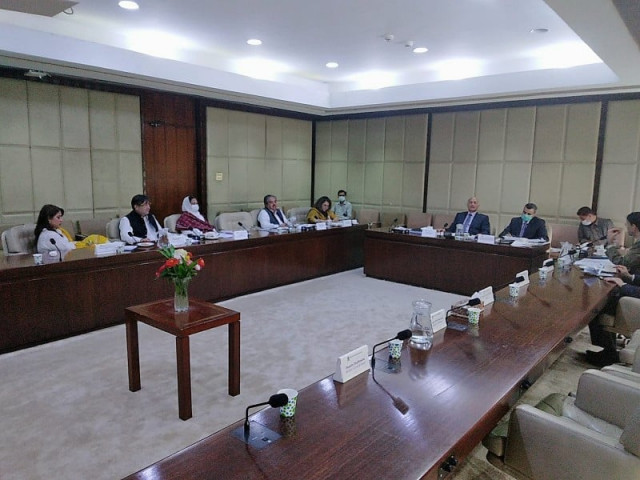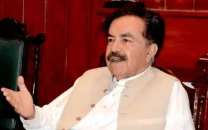Pakistan hasn’t given up on Afghan peace
NSA says 0.5 to 0.7m new Afghan refugees may enter Pakistan if situation remains volatile

Despite grim prospects of any peace in Afghanistan, Pakistan has not given up on its efforts seeking a political solution to end the war in the neighboring country.
Briefing the Senate Standing Committee on Defence, National Security Adviser (NSA) Dr Moeed Yusuf said on Wednesday Pakistan will make all out efforts for a negotiated settlement of the Afghan conflict.
"The Afghan government and the Taliban should resolve the issue through talks," Dr Moeed told the committee in an in-camera briefing. He briefed the Senators about the latest Afghan situation on a day when the Afghan Taliban took control of a key border crossing between Pakistan and Afghanistan.
Since the US and Nato forces started withdrawing from Afghanistan, the Taliban have made rapid inroads, overrunning key districts with little resistance from the Afghan forces.
Against this backdrop, Dr Moeed told the committee that the international community and Afghan neighbours must devise a strategy to deal with the possible influx of refugees.
Pakistan fears that an estimated 0.5 to 0.7 million new Afghan refugees may enter Pakistan if the situation there remains volatile. Dr Moeed urged the international community to take steps so that
Afghans may not flee to Pakistan. The in-camera briefing session which lasted for 2 hours included a detailed and interactive question and answer (Q&A) session.
The committee meeting – presided over by Senator Mushahid Hussain Sayed – was also briefed on Pakistan’s role in the changing regional scenario, Pakistan-US relations, Pakistan-India relations and the impact of the evolving situation in Afghanistan following the US military exit.
The committee was informed that a broad-based roadmap is developed for Pakistan-US relations including cooperation in commerce, trade and investment including vaccine manufacturing, climate change and military to military relations as well as promoting regional economic connectivity.
Dr Moeed also briefed the committee about his meeting with his US counterpart in Geneva last month.
He said Pakistan’s perspective on Afghanistan is very clear and it is based on promoting an inclusive political settlement with a view to ensure that Afghanistan is not used against Pakistan and vice versa.
Read more: Taliban claim to control key Afghan border crossing opposite Chaman
"The international community is also being informed about Pakistan’s concerns about the potential fallout of the Afghan crisis particularly in the shape of a new influx of refugees," he said.
On Pakistan-India relations, Dr Moeed said the onus is on India to start the dialogue process after reversing the wrongs in Indian Illegally Occupied Jammu and Kashmir (IIOJK), particularly the August 5, 2019 decision, its efforts to change the demographic balance in occupied territory plus the release of political prisoners and lifting of the internet blockade.
Referring to Pakistan’s transition to geo-economics, Dr Moeed said the three pillars of this strategic reorientation include regional connectivity, partnership for development and the quest for peace within and peace without.
He also invited input from the committee on defence and national security in the preparation of a comprehensive document pertaining to Pakistan’s national security policy.
In his remarks, the chairman of the committee, Mushahid Hussain Sayed welcomed Dr Moeed Yusuf and lauded his contribution in injecting fresh ideas and new thinking on Pakistan’s national security, particularly on strategic communication and the transition of geo-economics.
Sayed said the Senate Committee on Defence and National Security would present its own ideas and input as well on the issue of national security so that any policy that is formulated by the government is inclusive, broad-based and representative of all shades of opinion.
He also proposed that “lawfare” be made an integral component of Pakistan’s approach on national security and he also underlined the need for a comprehensive counter-terror strategy as well as a creative India policy that also has a broader South Asia perspective.
Lawfare refers to the use of law as a weapon of conflict
Senator Sayed said given the emerging situation in which national security can no longer be defined in terms of military might alone, the concept of human security must include elements that are crucial for the wellbeing of the people of Pakistan including health, climate change, population planning, food security and water scarcity, a perspective which Dr Moeed Yusuf fully endorsed.
All the members present participated in a candid discussion on issues of defence and national security and the committee expressed its satisfaction on the informative briefing that was provided by the NSA.
The committee also unanimously approved the Maritime Security (Amendment) Bill 2021.
The committee also appreciated the role of the Maritime Security Agency at a time when the sea lanes are becoming crucial in national security particularly trade and connectivity and the committee accepted the invitation from the agency’s director general to visit its headquarters in Karachi.
The committee also offered Fateha for the soldiers of the Pakistan Army who were martyred yesterday. The meeting was attended by Dr Zarqa Suharwardy Taimur, Hidayatullah, Mohammad Ayub, Rukhsana Zuberi, Palwasha Zai Khan and Secretary of the committee Major (retd) Syed Hasnain Haider.



















COMMENTS
Comments are moderated and generally will be posted if they are on-topic and not abusive.
For more information, please see our Comments FAQ